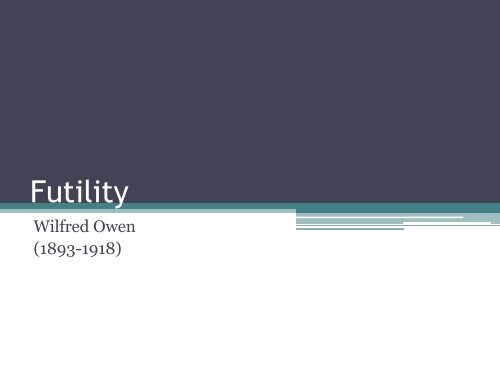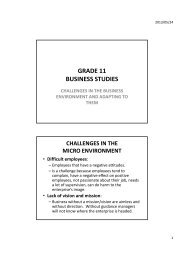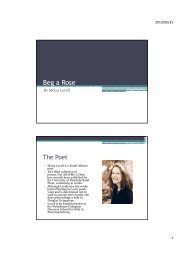14. Futility - Brebner High School
14. Futility - Brebner High School
14. Futility - Brebner High School
Create successful ePaper yourself
Turn your PDF publications into a flip-book with our unique Google optimized e-Paper software.
<strong>Futility</strong><br />
Wilfred Owen<br />
(1893-1918)
The Poet<br />
• Wilfred Edward Salter<br />
Owen was an English poet<br />
and soldier, one of the leading<br />
poets of the First World War.<br />
• His shocking, realistic war<br />
poetry on the horrors of<br />
trenches and gas warfare stood<br />
in contrast to both the public<br />
perception of war at the time,<br />
and to the confidently patriotic<br />
verse written earlier by other<br />
war poets.
The Poet<br />
• Among his best-known works<br />
— most of which were<br />
published posthumously — are<br />
"Dulce et Decorum Est",<br />
"Insensibility", "Anthem for<br />
Doomed Youth", "<strong>Futility</strong>" and<br />
"Strange Meeting".<br />
• He suffered several traumatic<br />
experiences during his service<br />
in the military.<br />
• One week before the end of the<br />
war he was shot in the head<br />
and killed.
<strong>Futility</strong><br />
Move him into the sun –<br />
Gently its touch awoke him once,<br />
At home, whispering of fields unsown<br />
Always it woke him, even in France,<br />
Until this morning and this snow. 5<br />
If anything might rouse him now<br />
The kind old sun will know.<br />
Think how it wakes the seeds –<br />
Woke, once, the clays of a cold star.<br />
Are limbs, so dear-achieved, are sides, 10<br />
Full-nerved – still warm – too hard to stir?<br />
Was it for this the clay grew tall?<br />
O what made fatuous sunbeams toil<br />
To break earth’s sleep at all?
Modern Sonnet<br />
• 14 lines<br />
• Contains elements of both or neither<br />
Shakespearean and Italian sonnets.<br />
In context of this sonnet:<br />
• 2 stanzas<br />
• Change in tone from stanza 1 to stanza 2<br />
• ababccc dedefff
Line 1<br />
Move him into the sun –<br />
• The ‘him’ is a fallen soldier.<br />
• The poet establishes the<br />
importance of the young man<br />
by mentioning him first.<br />
• Moving him into the sun<br />
(warmth) shows the speaker’s<br />
compassion for the fallen<br />
soldier.
Line 2<br />
Gently its touch awoke him once,<br />
• Personification<br />
• The poet is explaining why he<br />
wants to move the fallen<br />
soldier into the sun.<br />
• He is clinging to en empty<br />
hope that the soldier might<br />
just be sleeping, like he had<br />
been every other time the sun<br />
had awoken him.<br />
• ‘once’ refers to his past.<br />
• The speaker sees him as an<br />
individual with a story.
Line 3<br />
At home, whispering of fields unsown,<br />
• Personification<br />
• The speaker knew the young<br />
man, knows his past.<br />
• His references to the soldier’s<br />
past emphasises his feelings<br />
that they (young men) should<br />
not have been fighting this<br />
war.<br />
• Their lives should have<br />
followed a different path.<br />
• In the case of this soldier he<br />
should have been planting and<br />
working on his farm.
Line 4<br />
Always it woke him, even in France<br />
• The speaker says that the<br />
young man was always<br />
awakened by the sunrise, even<br />
in France.<br />
• This is a direct reference to the<br />
war, they were stationed in<br />
France.
Line 5<br />
Until this morning and this snow.<br />
• The use of ‘this’ to refer to the<br />
day and the weather shows<br />
that it was different to any<br />
other morning, there was<br />
something different to this<br />
day.<br />
• It refers to a battle.<br />
• The reference to the snow tells<br />
us that the sun did not help on<br />
this morning.<br />
• The cold was both literal and<br />
metaphorical (loss).
Line 6-7<br />
If anything might rouse him now<br />
The kind old sun will know.<br />
• There is desperation in the<br />
speaker’s tone.<br />
• He is looking for something<br />
that might prove that the<br />
fallen soldier is just sleeping<br />
and can be roused (awoken).<br />
• The lines are reminiscent of a<br />
line from a children’s story.<br />
• This reflects innocence and a<br />
child-like hope.<br />
• The sun is again personified<br />
and representative of good.
Line 8<br />
Think how it wakes the seeds –<br />
• In this stanza the speaker tries<br />
to rationalise why the sun can<br />
give life to so many other<br />
things, but not his friend.<br />
• It is personified throughout.<br />
• In this line he says it ‘wakes’<br />
the seeds. Seedlings need<br />
warmth in order to germinate.
Line 9<br />
Woke, once, the clays of a cold star.<br />
• This is both an evolutional and<br />
creationist reference.<br />
• Metaphor<br />
• The cold star is earth, before<br />
life developed.<br />
• The clay represents life, based<br />
on the biblical idea that<br />
humans were created from the<br />
clay of the earth.
Line 10-11<br />
Are limbs, so dear-achieved, are sides,<br />
full-nerved – still warm – too hard to stir?<br />
• The speaker does not<br />
understand how the sun can<br />
give life to everything, but is<br />
unable to revive his friend.<br />
• He states that everything the<br />
young man needs to sustain<br />
life is there.<br />
• He has his limbs and nerves,<br />
his body is still warm.<br />
• ‘dear-achieved’ implies that<br />
the speaker realises the<br />
wonder of the human body.
Line 12<br />
Was it for this the clay grew tall?<br />
• There is despair and bitterness<br />
in the speaker’s tone.<br />
• Biblical reference.<br />
• Personification<br />
• He asks if this type of<br />
savagery, the deaths of young<br />
men, was what God had in<br />
mind for creation.
Line 13-14<br />
O what made fatuous sunbeams toil<br />
To break earth’s sleep at all?<br />
• Personification<br />
• ‘O’ is a desperate cry.<br />
• The speaker has lost all hope.<br />
• He asks why we bother with<br />
life.<br />
• Why did God bother to create<br />
humans (with effort – toil) if<br />
all they do is destroy?<br />
• He implies that earth was<br />
peaceful (sleep) before.<br />
• He refers to the sunbeams as<br />
pointless and foolish.





